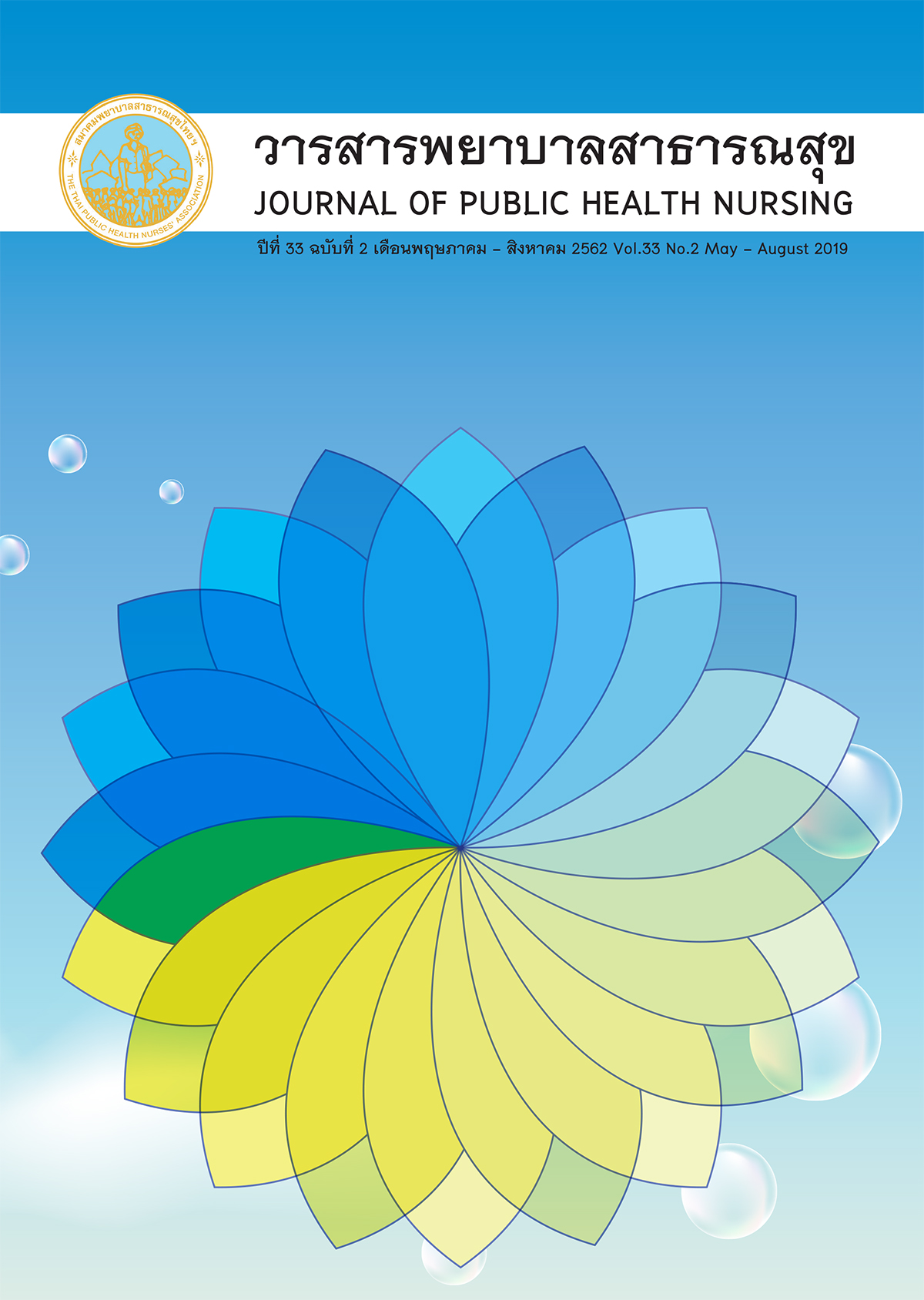EVIDENCE-BASED PRACTICE PROGRAM FOR TEENAGE PREGNANCY PREVENTION
Keywords:
Teenage pregnancy, Evidence base practice, Pregnancy prevention programAbstract
Teenage pregnancy results in higher medical complications as compared to other pregnancies. This quasi-experimental study aimed to examine evidence-based practice for teenage pregnancy prevention . The purposive sample of this study included 64 female teenage junior high school students in Prasat District, Surin Province who were equally divided into experimental and comparison groups. The experimental group receiveded evidence-based practice in a teenage pregnancy prevention program covering the topics of attitude adjustment, educational activities and skill training for teenage pregnancy prevention. Activities of the program were four two-hour sessions. Data were collected through self-administered questionnaire at pretest, one week and eighth weeks after intervention and were analyzed by Chi square and t-test.
After the program, the mean scores of attitude, knowledge, skills and behaviors among the experimental group were significantly higher than the mean scores before the program (p-value <0.001), and of those of the comparison group (p-value <0.05). At follow-up, the experimental group had mean scores of attitude, knowledge, skills and behaviors significantly different than in the posttest. (p-value <0.05).
The findings of this study suggest that teachers and/or community health nurses apply activities appropriate to the community for teen pregnancy prevention.
References
World Health Organization. Health for the World’s Adolescents A second chance in the second decade; 2014.
Unite for children, Situation analysis Teen pregnancy in Thailand [internet]. 2019 [cited 2019 September 4]. Available from https://www.unicef.org/thailand/media/1131/file.
Ministry of Social Development and Human Security. Fertility rate per 1,000 female population by maternal age group in 2002-2014. Office of the National Economic and Social Development Board [internet]. 2011 [cited 2015 July 6] Available from http://www.m-society.go.th/ewlnews.php?.nid=15733.2011. (in thai)
Sukrit B. Pregnancy in Teens: Policy Operational guidelines And the evaluation. Agricultural Cooperative federation of Thailand Printing house: Department of Health 2014; 2: 4-7.(in Thai)
Morrison-Beedy D, Jones SH, Xia Y, Tu X, Crean HF, Carey MP. (2013). Reducing sexual risk behavior in adolescent girls: results from a randomized controlled trial. Journal of Adolescent Health 2013; 52(3): 314-21.
Boyer CB, Shafer MA, Shaffer RA, Brodine SK, Pollack LM, Betsinger K, et al. Evaluation of a cognitive–behavioral, group, randomized controlled intervention trial to prevent sexually transmitted infections and unintended pregnancies in young women. Preventive medicine 2005; 40(4): 420-31.
Cowan FM, Pascoe SJ, Langhaug LF, Dirawo J, Chidiya S, Jaffar S, et al. The Regai Dzive Shiri Project: a cluster randomised controlled trial to determine the effectiveness of a multi‐component community‐based HIV prevention intervention for rural youth in Zimbabwe–study design and baseline results. Tropical Medicine & International Health 2008; 13(10): 1235-44.
Butcharoen W, Pichayapinyo P, Pawwattana A. Factors related to sexual risk behavior among Thai secondary school students. Journal of Public Health 2012; 42(1): 29-39. (in Thai)
Suthinphuak B, Chamroonsawasdi K, Suprap J, Taechaboonsermask P. Factors Influencing Sexual Abstinence Behavior among Secondary School Students in Samutprakan Province, Thailand. Journal of Public Health 2010; 40(3): 302-12. (in Thai)
Haggerty KP, McGlynn-Wright A, Klima T. Promising Parenting Programs for Reducing Adolescent Problem Behavior. Journal of children's services 2013; 8(4): 229-43.
Sackett DL. Rosenbery WM, Gray JA, Ha. Using a PICO method to organize Medical Evidence: A case study involving Medical students and The Cochrance Library. 1997 [cited 2015 Febuary 20]. Available from http://citeseerx.ist.psu.edu/viewdoc/domnnload?doi=101.1.408.2206&rep=rep1&type=pdf.
Polit DF, Hungler BP. Nursing Reserch: Principles and Methods 6th ed. Philadelphia: J.B. Lippincott; 1999.
PATH. Short film "THANG LEUK" project Up to me Awareness Campaign to Prevent Unsecured Pregnancy in Teens [internet]. 2011 [ cited 2015 December 4 ]. Available from http://www.youtube.com/watch?v.=vWhoPx4zn8.2011.
Sieving RE, McMorris BJ, Beckman KJ, Pettingell SL, Secor-Turner M, Kugler K, et al. Prime Time: 12-month sexual health outcomes of a clinic-based intervention to prevent pregnancy risk behaviors. Journal Adolescent Health 2011; 49(2): 172-9.
Berenson AB, Rahman M. A randomized controlled study of two educational interventions on adherence with oral contraceptives and condoms. Contraception 2012; 86(6): 716-24.
DiClemente RJ, Wingood GM, Harrington KF, Lang DL, Davies SL, Hook III EW, et al. Efficacy of an HIV Prevention Intervention for African American Adolescent Girls A Randomized Controlled Trial. JAMA 2004; 292(2): 171-9.
Krinara P, Ketvatimart M, Maneechot M. The Effects of Nursing Student-lead Unplanned Pregnancy Prevention Program on Knowledge, Attitude and Intention to Prevent Unplanned Pregnancy Among Early Adolescents. The Journal of Boromarajonani College of Nursing, Nakhonratchasima. 2013; 19(2): 20-30. (in Thai)
Flay BR, Graumlich S, Segawa E, Burn JL, Holliday MY. Effects of 2 Prevention Programs on High-Risk Behavior Among African American Youth: A Randomized trial. Archives of Pediatric and Adolescent Medicine 2004; 158(4): 377-84.
Coyle KK, Glassman JR, Franks HM, Campe SM, Denner J, Lepore GM. Interventions to reduce sexual risk behaviors among youth in alternative schools: a randomized controlled trial. Journal of Adolescent Health 2013; 53(1): 68-78.
Downloads
Published
How to Cite
Issue
Section
License
บทความที่ตีพิมพ์และแผนภูมิรูปภาพถือเป็นลิขสิทธิ์ของวารสารพยาบาลสาธารณสุข (Thai Public Health Nurses Association)







